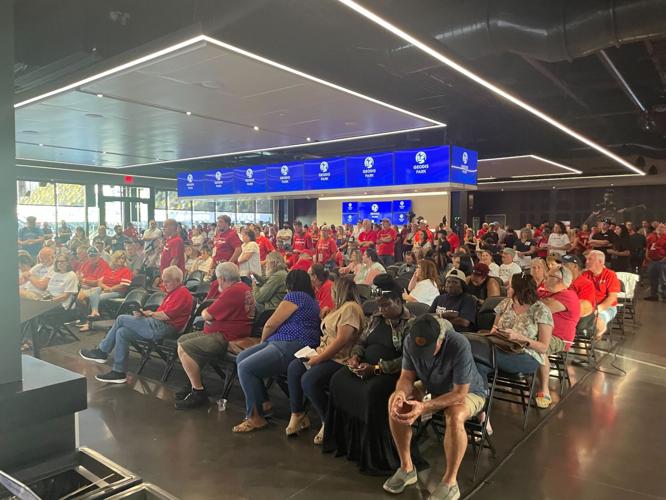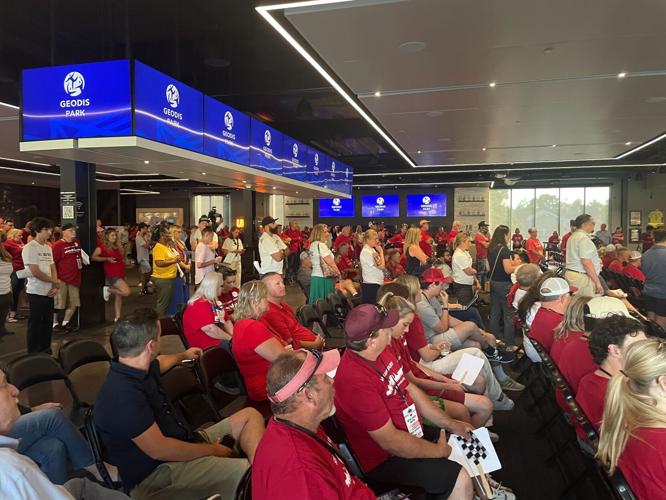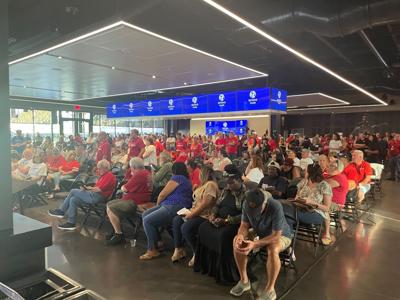Update, Aug. 1: Bristol Motor Speedway will pause efforts to secure a commitment from the city for a track overhaul, the operator announced on Tuesday. Executive Jerry Caldwell, who represented Bristol at last week’s community meeting, acknowledged that procedural constraints will prevent the deal from crossing the finish line during this term. Elections on Aug. 3 will determine a new council and, pending an expected runoff, a new mayoral administration. Bristol has indicated it will work with the next mayor to revive the project.
Supporters and opponents of the city’s proposed racetrack overhaul packed a club suite in Geodis Park Tuesday to directly address District 17 Councilmember Colby Sledge and Bristol Motor Speedway President Jerry Caldwell. The meeting was a show trial for the pricey plan, hammered out over several years between Mayor John Cooper and Bristol, to bring NASCAR racing to The Fairgrounds Nashville.
Caldwell and Bristol boosters commanded an army of red-shirted supporters who spoke repeatedly about sentimental connections to the track, the city’s historic support for racing and the other projects Nashville paid for while the racetrack languished. In its push to land the city contract, Bristol — also known by its parent corporation, Speedway Motorsports — has been working with Nashville PR firms Hall Strategies and Calvert Street. Calvert Street is led by principal Darden Copeland, who helped organize the successful 2011 referendum to enshrine fairgrounds racing in the city’s charter.
That fateful referendum marshaled a passionate, pro-fairgrounds constituency into a proxy battle over “old” and “new” Nashville under former Mayor Karl Dean. Major demographic changes and blowback from the Titans stadium deal have made it difficult to replicate the pro-fairgrounds groundswell of 2011, though the referendum’s overwhelming success still drives Copeland and NASCAR hopefuls.
In opposition, neighborhood groups joined with Stand Up Nashville, the economic justice organization that landed a community benefits agreement with Nashville SC in 2018. Citizens Against Racetrack Expansion for Nashville has funded countywide mailers, distributed yard signs and organized advocates against the deal. Pro-racing audience members heckled the group for its antagonism, often referring to opponents by the acronym CAREN.
“I can’t afford to go to a Titans game every Sunday,” one red-shirted speaker said on the mic. “But I can afford to go to a race.”
“The more people learn about this giveaway, the less they like it,” CARE president John Spragens tells the Scene. “It’s a bad deal for taxpayers. We take all the risk while an out-of-state company makes all the profits — running loud NASCAR races in the middle of a neighborhood.”
While red visually dominated the space, a long line of opponents kept the meeting going for hours. Opponents spoke about noise, increased traffic, neighborhood quality of life, and the deal’s massive public subsidies, which they said would embroil the city in yet another financial thicket.
“I cannot do my taxes, record music, do anything when races are going on,” said Andrea, one neighbor speaking in opposition who didn’t share her last name. “This just feels like billionaire boys with their toys. There is a speedway 20 miles south of here. Go there if you really believe in NASCAR.”
Bristol’s parent company, Speedway Motorsports, also operates the Nashville Speedway in Lebanon, which hosts the Ally 400, a NASCAR Cup Series race.
Both sides are angry about how the city has changed. Formerly a working-class white neighborhood (with a racial boundary at Fourth Avenue), the area now known as Wedgewood-Houston has become an enclave for wealthy young professionals. The NASCAR fans, who referenced public funding for a new Titans stadium and Geodis, say these people can deal with a little noise. Racing fans have been coming to the fairgrounds for decades — it’s time they got something too, said speakers. Opponents’ arguments connected plans to overhaul the track — a direct effect of growth-minded, tourism-obsessed officials, they argued — to generally misplaced city priorities that put arenas over transit or housing.
Speakers’ comments supported the consensus that, even across lines of race, class and geography, residents agree that Nashville is on the wrong track. The same thread of resentment has animated local politics in recent years and, backed by a growing body of polling data, has formed an ideological basis for this year’s mayoral candidates, specifically downtown Councilmember Freddie O’Connell.

Opponents and supporters gather at Geodis Park for a meeting about the city’s proposed racetrack overhaul, July 25, 2023
“Nine times out of 10, things go with the money,” said one racetrack supporter. He was on his way out, walking in the shadow of Geodis with two other red-shirted compatriots. All were older, white and male, like many NASCAR fans and track proponents.
There is money on both sides. Conservative billionaire John Ingram, primary owner of Nashville SC, has come out against the track, which would nuzzle up against his new soccer arena. The Smith family took Speedway Motorsports private in 2019. One of NASCAR’s track giants, the corporation operates 11 sites and brings in hundreds of millions of dollars per year.
According to polling done July 17 to 19 by the Tennessee Laborers PAC, the track overhaul is unpopular across the city among both Republicans and Democrats. Just 32 percent of respondents support “building a 30,000-seat racetrack facility on the current Nashville Fairground Speedway site with plans to attract a new NASCAR race and other high-profile racing events.” Strong support drops to 14 percent while 61 percent oppose the track (with 43 percent strongly opposing).
If anyone influential was swayed last night, it likely won’t matter in the short term. Now that Sledge held a community meeting, the Metro Council, which has only two meetings left this term, can officially take up the lease. The deal needs three meetings to pass, and barring a late-called special meeting, lease debate will die when the term ends. NASCAR’s prospects are dim. Metro power player James Weaver, the prolific Holland & Knight lobbyist enlisted by Bristol, has reportedly left for summer vacation. Most leading mayoral candidates are either vocally against the deal or silent on it, indicating that Bristol’s army of lobbyists and PR professionals will have to make another expensive push with the next administration to get it back on the city’s agenda.
This article has been updated since initial publication with additional quotes and context.







